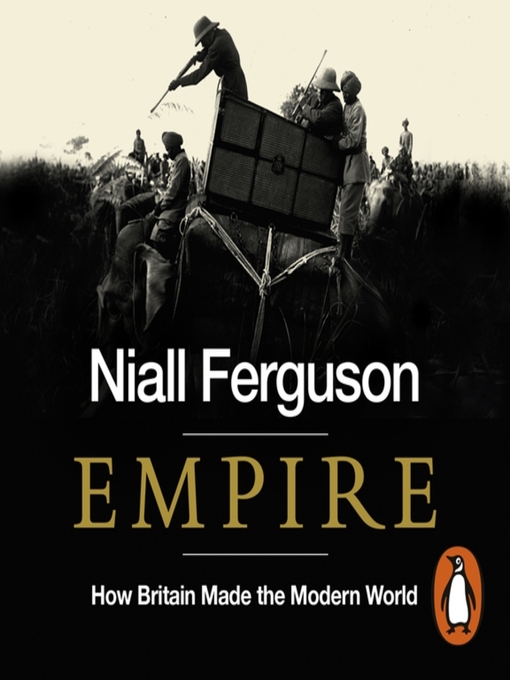Brought to you by Penguin.
Once vast swathes of the globe were coloured imperial red and Britannia ruled not just the waves, but the prairies of America, the plains of Asia, the jungles of Africa and the deserts of Arabia. Just how did a small, rainy island in the North Atlantic achieve all this? And why did the empire on which the sun literally never set finally decline and fall? Niall Ferguson's acclaimed Empire brilliantly unfolds the imperial story in all its splendours and its miseries, showing how a gang of buccaneers and gold-diggers planted the seed of the biggest empire in all history - and set the world on the road to modernity.
'The most brilliant British historian of his generation ... Ferguson examines the roles of "pirates, planters, missionaries, mandarins, bankers and bankrupts" in the creation of history's largest empire ... he writes with splendid panache ... and a seemingly effortless, debonair wit' Andrew Roberts
'Dazzling ... wonderfully readable' New York Review of Books
'A remarkably readable précis of the whole British imperial story - triumphs, deceits, decencies, kindnesses, cruelties and all' Jan Morris
'Empire is a pleasure to read and brims with insights and intelligence' Sunday Times
-
Creators
-
Publisher
-
Release date
May 25, 2010 -
Formats
-
OverDrive Listen audiobook
- ISBN: 9780141963983
- File size: 176220 KB
- Duration: 06:07:07
-
-
Languages
- English
-
Reviews
-
AudioFile Magazine
Niall Ferguson reminds us why the British Empire is still important. It's no accident that today the international language of science, diplomacy, and commerce is English, or that the predominant superpower in the world is the United States. All of this is a consequence of the British Empire's world domination, which peaked at the end of the nineteenth century and essentially ended by the mid-twentieth. How this came to be is a "ripping yarn." Ferguson compresses three hundred years of history by focusing on exemplary men and events, recounting their stories in a dramatic fashion more worthy of the cinema than a textbook. The tone is more than appropriate for the highway-bound multitasking audiophile who seeks to understand the broad strokes of history. J.W. (c) AudioFile 2004, Portland, Maine -
Publisher's Weekly
February 24, 2003
Acclaimed British historian Ferguson (The Pity of War) takes the revisionist (or perhaps re-revisionist) position that the British Empire was, on balance, a good thing, that it "impos free markets, the rule of law... and relatively incorrupt government" on a quarter of the globe. Ferguson's imperial boosterism differs from more critical recent scholarship on the empire, such as Linda Colley's Captives
(Forecasts, Dec. 2, 2002) and Simon Schama's A History of Britain: The Fate of Empire
(Forecasts, Dec. 23, 2002). Ferguson's gracefully written narrative traces the history of the empire from its beginnings in the 16th century. As Ferguson tells it, by the 18th century British consumers had developed a strong taste for sugar, tobacco, coffee, tea and other imports. The empire's role was to supply these commodities and to offer cheap land to British settlers. Not until the late 18th century did Britain add a "civilizing mission" to its commercial motives. Liberals in Britain, often fired by religious feelings, abolished the slave trade and then set out to Christianize indigenous peoples. Ferguson gives a wonderful account of the fabled career of missionary and explorer David Livingstone. The author admits that the British sometimes responded to native opposition with brutality and racism. Yet he argues that other empires, especially those of Germany and Japan, were far more brutal (a not entirely satisfying defense). Indeed, Ferguson contends that Britain nobly sacrificed its empire in order to defeat these imperial rivals in WWII. His provocative and elegantly written account will surely trigger debate, if not downright vilification, among history readers and postcolonial scholars. 25 color illus., b&w illus., maps. (Apr.)Forecast:The young and attractive Ferguson is something of a celebrity in Great Britain, where he's been called "the Errol Flynn of British history"; so expect additional media attention. He currently teaches at New York University.
-
Loading
Why is availability limited?
×Availability can change throughout the month based on the library's budget. You can still place a hold on the title, and your hold will be automatically filled as soon as the title is available again.
The Kindle Book format for this title is not supported on:
×Read-along ebook
×The OverDrive Read format of this ebook has professional narration that plays while you read in your browser. Learn more here.


